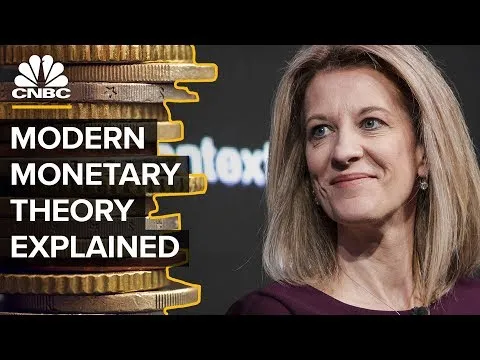Modern monetary theory (MMT) is a heterodox approach to macroeconomic theory where the roles of fiscal and monetary policies are not separated as in mainstream economics. What that means, simply put, is that government deficits as long as they are not excessive are nothing to worry about as they can be easily covered by printing money. Under MMT, taxes would only be needed to cool down an overheated economy.
Here's professor Stephanie Kelton on MMT:
I've seen people write about the idea that taxes are are obsolete in a model where money is not based on anything with a restricted supply like gold. Until the 1970's, the dollar was at least nominally in the gold standard. The Bretton Woods agreement made in the late 1940's had the rest of the world's currencies pegged to the dollar. Even after that, central banks have had price stability as their goal. Central banks have had at least theoretically a mandate independent from governments.
It is safe to say that the independence of central banks is a thing of the past now. They have no choice but to plug the vast gaps in the budgets of governments. Hence, what we have now is MMT being implemented by default.
Now, let's assume taxes are abolished. A small number of taxes like are left in place for the purposes of cooling down the economy if it overheats. As we have seen, money printing would have to be scaled up to a level many multiples of what it is now. Central bank balance sheets would skyrocket.
What would that do to the purchasing power of money? Obviously, it would have to go down as in real terms inflation would now be the de facto form of taxation, that is, the government's method to appropriate a share of the productive capacity of the economy for its own purposes.
Now, what if people started using cryptocurrencies as a medium of exchange instead of fiat? That would be akin to tax dodging. The government would be left holding increasingly worthless fiat bags. If that were to happen, you can bet the farm on governments starting to regulate cryptocurrencies highly aggressively.
If cryptocurrencies remain store of value assets or at best utility tokens on specific platforms, governments will leave them alone. As long as people are going to have to rely on fiat to buy groceries and such, governments will have no problem with cryptocurrencies, which will in that case be like air miles, discount coupons, loyalty points or such - even if taxation were mostly abolished.
